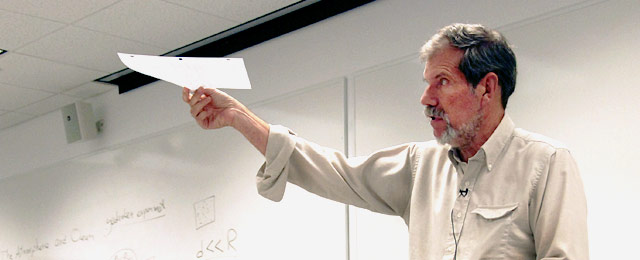Online courses directory (423)
This course is an introduction to cognitive development focusing on children's understanding of objects, agents, and causality. It develops a critical understanding of experimental design. The course discusses how developmental research might address philosophical questions about the origins of knowledge, appearance and reality, and the problem of other minds. It provides instruction and practice in written communication as needed for cognitive science research (including critical reviews of journal papers, a literature review and an original research proposal), as well as instruction and practice in oral communication in the form of a poster presentation of a journal paper.
The course will start with an overview of the central and peripheral nervous systems (CNS and PNS), the development of their structure and major divisions. The major functional components of the CNS will then be reviewed individually. Topography, functional distribution of nerve cell bodies, ascending and descending tracts in the spinal cord. Brainstem organization and functional components, including cranial nerve nuclei, ascending / descending pathways, amine-containing cells, structure and information flow in the cerebellar and vestibular systems. Distribution of the cranial nerves, resolution of their skeletal and branchial arch components. Functional divisions of the Diencephalon and Telencephalon. The course will then continue with how these various CNS pieces and parts work together. Motor systems, motor neurons and motor units, medial and lateral pathways, cortical versus cerebellar systems and their functional integration. The sensory systems, visual, auditory and somatosensory. Olfaction will be covered in the context of the limbic system, which will also include autonomic control and the Papez circuit. To conclude, functional organization and information flow in the neocortex will be discussed.
This course gives a mathematical introduction to neural coding and dynamics. Topics include convolution, correlation, linear systems, game theory, signal detection theory, probability theory, information theory, and reinforcement learning. Applications to neural coding, focusing on the visual system are covered, as well as Hodgkin-Huxley and other related models of neural excitability, stochastic models of ion channels, cable theory, and models of synaptic transmission.
Visit the Seung Lab Web site.
This course explores the organization of synaptic connectivity as the basis of neural computation and learning. Perceptrons and dynamical theories of recurrent networks including amplifiers, attractors, and hybrid computation are covered. Additional topics include backpropagation and Hebbian learning, as well as models of perception, motor control, memory, and neural development.
This course surveys questions about human behavior and mental life ranging from how you see to why you fall in love. The great controversies: nature and nurture, free will, consciousness, human differences, self and society. Students are exposed to the range of theoretical perspectives including biological, evolutionary, cognitive, and psychoanalytic. One of the best aspects of Psychology is that you are the subject matter. This makes it possible to do many demonstrations in lecture that allow you to experience the topic under study. Lectures work in tandem with the textbook. The course breaks into small recitations sections to allow discussion, oral presentations, and individual contact with instructors.
This comprehensive course on the visual system is designed to ground future researchers in the field of visual science and to provide scientists with an excellent basis for using the visual system as a model in research. In this graduate seminar, anatomical, neurophysiological, imaging and behavioral research is examined in an attempt to gain a better understanding of how information is processed in the primate visual system.
PURPOSE OF COURSE…
Organic Chemistry of Macromolecules covers the preparation, reactions, and properties of high molecular weight polymeric materials of both natural and synthetic origin. As a part of this course, U-M students collaboratively created and edited Wikipedia articles. Course Level: Graduate This Work, Chemistry 538 - Organic Chemistry of Macromolecules, by Anne McNeil is licensed under a Creative Commons Attribution-ShareAlike license.
This course is a survey of the scientific study of human nature, including how the mind works, and how the brain supports the mind. Topics include the mental and neural bases of perception, emotion, learning, memory, cognition, child development, personality, psychopathology, and social interaction. Students will consider how such knowledge relates to debates about nature and nurture, free will, consciousness, human differences, self, and society.
Course Format
 This course has been designed for independent study. It includes all of the materials you will need to understand the concepts covered in this subject. The materials in this course include:
This course has been designed for independent study. It includes all of the materials you will need to understand the concepts covered in this subject. The materials in this course include:
- A full set of Lecture Videos by Prof. John Gabrieli.
- Reading Assignments in several books, including one free online textbook and detailed notes on another book.
- Assorted multiple choice and short answer questions to Check Yourself on the material in each session.
- Supporting Discussion content that elaborates on the lectures and reading.
- A rich collection of online resources for Further Study on each session's topics.
- A full set of Exams with solution keys, and extra practice questions for review.
Other Versions
Other OCW Versions
OCW has published multiple versions of this subject. ![]()





















